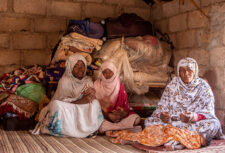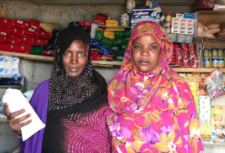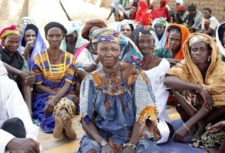Disclaimer: This article is more than 14 years old, and may not include the most up-to-date information or statistics. Please verify information with more recent sources as needed, and if you have any questions contact our Press Office.
3 November 2009
Slavery persists in Mauritania despite the criminalisation of the practice in 2007, according to a UN independent expert.
Speaking at the end of her fact-finding mission to the North African country, Gulnara Shahinian, the UN Special Rapporteur on Contemporary Forms of Slavery, said: “There are all forms of slavery in Mauritania. There is child labour, domestic labour, child marriages and human trafficking.”
It is estimated that 18 per cent of Mauritania’s population (over half a million people) are held in slavery. The slavery has historical roots in the ownership of the indigenous black population by a ruling Arab-Berber elite.
Slaves belong to a ‘slave caste’ and are born into slavery. They are owned and controlled by their masters, and are treated as their property. They are forced to work for their masters throughout their lives and are never paid for their work.
During her ten-day visit the Special Rapporteur spoke to people directly affected by slavery. “These victims said that they were utterly deprived of their basic human rights,” she said.
She added: “Having no alternative, they voluntarily stay or after fleeing, return back to slavery. This perpetuates the vicious circle of slavery for men, women and children. The women I met felt that they were the most vulnerable as they suffer triple discrimination firstly as women, secondly, as mothers and thirdly as slaves.”
The Special Rapporteur was officially invited by the Mauritanian Government, which has been under fire for falling to prosecute a single slave-owner since slavery was criminalized. The regime is led by Mohammed Ould Abdelaziz, the former general who led the military coup that ousted the previous president in August 2008.
Anti-Slavery International’s Africa Programme Co-ordinator, Romana Cacchioli, welcomed the Special Rapporteur’s findings. She said: “We hope that her visit will galvanise the Government into taking immediate action towards eradicating slavery by ensuring that the slavery law is applied.”
She added: “Appropriate measures should be taken to ensure those leaving slavery can access their human rights and lead fully free and economically independent lives. We are hopeful that this visit will mean closer collaboration between the government and national and international partners towards building a national coalition to fight this age old problem.”
Boubacar Messaoud of Mauritania’s anti-slavery group SOS Esclaves met with the Special Rapporteur during her visit. “The fact that she acknowledges these realities will help us convince the government to fight on this issue,” he said.





